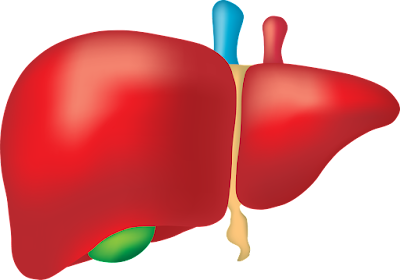Keeping your
liver healthy is important for overall well-being and maintaining proper body functions. The liver plays a vital role in detoxification, metabolism,
digestion, and storage of essential nutrients. In this comprehensive guide, we
will explore various aspects of liver health and provide practical tips to help
you keep your liver healthy.
- Maintain a Healthy Weight:
- Obesity and excess body weight
increase the risk of non-alcoholic fatty liver disease (NAFLD) and liver
damage.
- Follow a balanced diet, engage
in regular physical activity, and strive to achieve and maintain a
healthy weight.
- Consult with a healthcare professional
to determine your ideal weight and create a personalized plan if needed.
- Eat a Nutritious Diet:
- Consume a well-balanced diet
that includes a variety of fruits, vegetables, whole grains, lean
proteins, and healthy fats.
- Incorporate foods rich in antioxidants
such as berries, leafy greens, and cruciferous vegetables.
- Limit your intake of processed
foods, saturated fats, trans fats, and added sugars.
- Avoid or minimize alcohol
consumption, as excessive alcohol intake can lead to liver damage.
- Stay Hydrated:
- Drink an adequate amount of
water throughout the day to support liver function and overall health.
- Proper hydration helps in the
transportation of nutrients and elimination of waste products.
- Limit Alcohol Consumption:
- Alcohol is a major cause of
liver damage and can lead to alcoholic fatty liver disease, hepatitis,
and cirrhosis.
- If you choose to drink alcohol,
do so in moderation. Follow guidelines recommended by health
organizations: up to one drink per day for women and up to two drinks per
day for men.
- Practice Safe Medication Use:
- Some medications, when taken in
excessive amounts or over a prolonged period, can harm the liver.
- Follow medication instructions
carefully, including dosage and duration of use.
- Inform your healthcare provider
about any existing liver conditions or concerns.
- Vaccinations:
- Protect yourself against
hepatitis A and B by getting vaccinated, as these viral infections can
cause liver inflammation and damage.
- Check with your healthcare
provider to ensure you are up to date with recommended vaccinations.
- Practice Safe Sex and Prevent
Bloodborne Infections:
- Unprotected sex and sharing
needles increase the risk of hepatitis B and C, which can lead to liver
damage.
- Practice safe sex by using
barrier methods such as condoms and avoid sharing needles or other drug
paraphernalia.
- Practice Good Hygiene:
- Wash your hands regularly,
especially before handling food or eating, to reduce the risk of
contracting hepatitis A or other infections that can affect the liver.
- Exercise Regularly:
- Engage in regular physical
activity to improve overall health and reduce the risk of fatty liver
disease.
- Aim for at least 150 minutes of
moderate-intensity aerobic activity or 75 minutes of vigorous activity
per week.
- Exercise helps maintain a
healthy weight, improves insulin sensitivity, and reduces liver fat
accumulation.
- Avoid Exposure to Toxins:
- Minimize exposure to chemicals,
toxins, and pollutants that can harm the liver.
- Use protective equipment and
follow safety guidelines when working with chemicals or toxins.
- Be cautious with household
cleaning products, pesticides, and other potentially harmful substances.
- Limit Intake of Processed Foods
and Added Sugars:
- Processed foods often contain
high levels of unhealthy fats, sodium, and added sugars, which can
contribute to liver damage.
- Opt for fresh, whole foods
whenever possible, and limit your consumption of processed snacks, sugary
beverages, and desserts.
- Maintain a Healthy Gut:
- The health of your gut
microbiome can impact liver health. Consume a diet rich in fiber from
fruits, vegetables, whole grains, and legumes to support a healthy gut
microbiota.
- Consider incorporating fermented
foods like yogurt, kefir, sauerkraut, and kimchi, which can promote gut
health.
- Control Diabetes:
- Poorly managed diabetes can lead
to fatty liver disease and liver damage. Control your blood sugar levels
through a combination of a balanced diet, regular exercise, and
medication if prescribed.
- Consult with your healthcare
provider for personalized advice and guidance.
- Manage Stress:
- Chronic stress can contribute to
liver disease. Practice stress-management techniques such as deep
breathing, meditation, yoga, or engaging in hobbies you enjoy.
- Maintain a healthy work-life
balance and prioritize self-care.
- Get Regular Health Check-ups:
- Schedule regular check-ups with
your healthcare provider to assess your overall health, including liver
function.
- Discuss your medical history,
lifestyle habits, and any concerns you may have.
- Follow your healthcare
provider's recommendations for screenings, vaccinations, and preventive
measures.
- Avoid Unregulated Herbal
Supplements and Drugs:
- Certain herbal supplements and
medications can have hepatotoxic effects and harm the liver.
- Consult with a healthcare
professional before starting any new herbal supplements or alternative
therapies.
- Quit Smoking:
- Smoking damages the liver and
increases the risk of liver diseases.
- Quitting smoking is the best way
to improve liver health. Seek professional help, if required.
- Avoid exposure to secondhand
smoke and environments that promote smoking.
- Be Mindful of Hepatitis:
- Hepatitis B and C are viral
infections that can cause chronic liver disease and lead to liver damage.
- Practice safe sex, avoid sharing
needles, and get vaccinated to protect yourself against hepatitis.
- Know Your Family History:
- Some liver conditions, such as
hereditary hemochromatosis or Wilson's disease, have a genetic component.
- Familiarize yourself with your
family's medical history and inform your healthcare provider to identify
potential risks.
- Stay Informed:
- Stay updated on the latest
research and recommendations related to liver health.
- Attend educational seminars,
read reputable sources, and consult healthcare professionals for
personalized advice.
Taking care
of your liver involves adopting a holistic approach that includes maintaining a
healthy lifestyle, avoiding liver-damaging substances, and seeking professional
guidance when needed. By incorporating these habits into your daily life, you
can significantly improve your liver health and overall well-being. Remember,
prevention and early detection are key to maintaining a healthy liver.
Visit Enlightopia Blog for more Learning Content
absolutely FREE...!!
Tags:
#Enlightopia Health, @Enlightopia Health, #Enlightopia Healthy Liver, @Enlightopia
Healthy Liver, #Enlightopia Liver







No comments:
Post a Comment